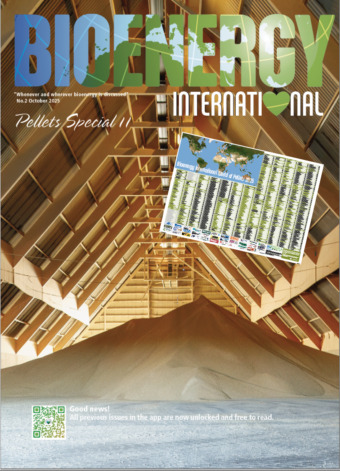Lithuania is the sixth EU Member State to celebrate its National Bioenergy Day on this year's listing of Bioenergy Europe's National Bioenergy Days. Like its Baltic and Nordic neighbours, bioenergy for heat and power plays a key role. Indeed, the transition of Lithuania's extensive district heating infrastructure from (Russian) gas dependency to domestic biomass resources has been transformative.
The European Bioenergy Day campaign aims to shed light on the increasingly central role that sustainable biomass is playing in the EU’s energy transition.
According to Bioenergy Europe, bioenergy is a vital component of the EU’s energy system and economy, producing 85 percent of the EU’s renewable heat, representing alone one-third of renewable energy sector jobs, and saving enough carbon dioxide (CO2) emissions to cover the annual emissions of Spain.
Awareness campaign
The campaign provides key facts on biomass and the bioenergy industry and celebrates people, projects, and companies contributing to achieving European carbon neutrality.
In the past years, Bioenergy Europe launched the European Bioenergy Day campaign to provide tangible, first-hand examples of how bioenergy impacts the lives of EU citizens.
Facts
Background European Bioenergy Day

First launched in 2018, the European Bioenergy Day campaign is powered by Bioenergy Europe and relayed across Europe by both national and international partners supporting the belief that bioenergy is more than a renewable energy source, but a reliable path that will lead Europe to achieve its renewable energy transition.
Each year, Bioenergy Europe calculates the Bioenergy Day of the European Union (EU) and each Member State, showing how long a Member State or the EU could meet their energy needs using only bioenergy until the end of the year.
Every National Bioenergy Day is accompanied by a story, showcasing the impact of bioenergy in the EU, whereas the European Bioenergy Day is highlighted at the annual European Bioenergy Future conference.
This year’s motto is “Our Shared Steps Towards the Energy Transition” and the 2024 European Bioenergy Day campaign aims to share these stories, highlighting how bioenergy supports the local (bio)economy, fosters innovation, and boosts the EU’s competitiveness.

As the EU advances towards its climate goals, bioenergy continues to expand its role as a key ally in the transition.
The new EU mandate will address critical issues such as climate change, energy security, and the rising cost of living.
In this context, bioenergy is a key ally for the EU’s economy, sustainability, and energy security.
It offers a viable alternative to fossil fuels and it is a key player in carbon dioxide removal (CDR) technology thanks to bioenergy with carbon capture and storage (BECCS), and biochar through pyrolysis with carbon capture and storage (PyCCS).
A transformative transition
Lithuania’s transition from Russian fossil gas dependency to domestic biomass resources in district heating and combined heat and power (CHP) has been transformative.
Changes in national legislation have encouraged increased heat competition and energy efficiency, reduction of distribution losses, and a switch to biomass fuel.
Already in 2012, AB Kauno Energija the district energy provider in Kaunas, the second largest city in Lithuania, embarked on an ambitious renovation, conversion, and expansion investment program to reduce consumer heat prices to among the lowest in the country.
Others have followed suit, not least the Capital city of Vilnius with the commissioning of Vilniaus Kogeneracinė Jėgainė (Vilnius CHP), a subsidiary of energy company Ignitis Group as highlighted in Bioenergy Europe’s success story for Lithuania. Here both non-recyclable municipal solid waste (MSW) and biomass are used in the multi-unit plant.

On the supply side, Lithuania is home to Baltpool, which has pioneered an international biomass exchange for trade auctions of standardized biomass products taking advantage of the country’s lead in digitalization and the Internet of Things
Founded in 2012, and currently active in the Baltics, Nordics, Germany, Spain, Poland, and the UK, Baltpool is a part of Lithuania‘s state-owned EPSO-G energy transmission and exchange group.
In Lithuania, it also organizes timber and heat auctions and administers funds for services of public interest in the electricity sector.
Finally, it is also worth noting that while the consumption of imported fossil gas for heat and power has been radically reduced, an opportunity arises for the production and distribution of biomethane aka renewable natural gas (RNG) using the existing gas grid infrastructure.
AB Kaišiadorių Paukštynas, an indirect subsidiary of AB Akola Group, one of the largest agribusiness companies in the Baltic region has plans to produce up to 1,000 Nm3 of biomethane per hour from poultry litter and other agricultural biowastes.



